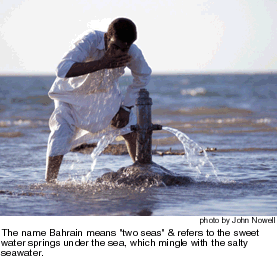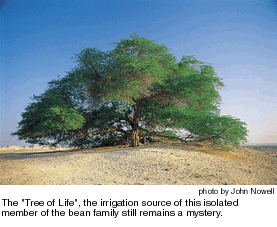




In a Landscape of Tension, Bahrain Embraces Its Jews. All 36 of Them
A Special International Report Prepared by The Washington Times Advertising Department -
Published on March 21, 2000





The Jews
of Bahrain:
"I consider myself a Bahraini
Jewish Arab - and I am very proud of it."
Visitors to Bahrain are always surprised to learn that Jews and Arabs live, and work, together here; but Bahrainis consider it odd that people think their situation is unusual.
"I know nowhere but Bahrain. I was born here, and my friends are here. I spend my nights with them, I spend my days with them, and I do my business with them. Religion is not an issue. When my friends come to my house, at prayer time they go to a room in my house and pray. They don't say, "This is a Jewish house, I will not pray in it." This is just an example. People see it as a big deal, but for us, it's not a big deal," says Rouben D. Rouben, 46, sole distributor of Sharp Electronics in the country.
| The Jewish community
began to settle in Bahrain in the early 1900s, most of them came from Iraq,
Iran and India -- traders who found Bahrain the ideal place to live. "My
family moved to Bahrain in 1914. Nothing happened to make us leave Iraq.
My grandfather was a trader and when he came here, he just decided he wanted
to live here," says Rouben.
Before the creation of Israel in 1948, 600 Jews lived in Bahrain. But after each Middle East war, some Bahraini Jews would leave the country, most went to the U.S. or England. Today only 30 Jews live in Bahrain, but the Jewish community is on the rise. "My brother has five children, and many of the others that live here all have a couple of children, so we are getting bigger, not smaller," says Rouben, a confirmed bachelor. |
 |
When waves of protest rose throughout the Arab world over Israel's creation 1948, some Bahrainis held demonstrations in the streets, but no Jewish businesses were vandalized, or destroyed.
And, according to Rouben, it was not Bahrainis who destroyed their synagogue in 1948.
"The problems didn't come from the Bahrainis, but from a few foreigners. At that time, there were a lot of pearl divers and Iranian merchants coming here to trade. There were a few problems, but none of the Bahrainis were involved. When riots broke out in the streets protesting the creation of Israel, many of the Jewish families took refuge with Bahraini friends and their families. Most of the Jews stayed in Muslim houses until things settled down," says Rouben.
"In 1948 these foreigners raided
the synagogue, and I think a house was burned. But nobody was hurt. Some
people decided to leave, but not because anything happened personally to
them," says Rouben.
| "I remember 1967 very
well; there were also demonstrations on the streets. I was 10 or12 years
old, and we were standing in our shop and my brother wanted to close the
shutters. A policeman told him not to do it. "We are here, you have nothing
to worry about," he said. The demonstrations weren't violent, they were
just shouting against Israel. They never touched any of our shops or homes,
and I don't think they would have -- even if the police weren't there."
"For me, Israeli is a nationality and not a religion. The religion is Jewish, but they are mixing this with that. Okay, it's a Jewish state, but Israel is not Judaism," Rouben says. |
 |
Meir Nonoo 58, is one of the Bahraini Jews that decided to give another country a try, only to come back home. "Because of the sluggish economy in the '60s, I left here to live in Great Neck, Long Island. But I returned to Bahrain as soon as the economy picked up. I lived there for 11 years and got a really good job. I actually ended up being the vice president of a major bank in New York, doing foreign exchange. Then, with the advent of the oil boom, my brother asked to come back to look after the family business, which I did, and I can say that we've built up a nice family business."
And the Jews of Bahrain aren't worried about anyone try to get a piece of their "family business." Rouben said he has had the Sharp dealership since 1965. "No one would ever try to do such a thing here. All Bahrainis have equal rights, and the government would protect us.
"My brother is the director of some companies here that are on the stock exchange here in Bahrain. And another brother, who recently passed away, was the managing director of Bahrain Cinema Company."
Rouben says the Bahraini Jews all have successful positions: "For us, we started our businesses from nothing. My father was working as a cashier chief for 35 years, and now, thank God, we are okay. If there were any 'ifs' or 'buts', we wouldn't have reached this stage.
| "Everyone here has their
niche," Rouben continues. "We are involved in electronics. Next to us is
the Ambassador Store; they're the agents for Seiko, Akai and Pioneer. They
are also Jews, but they live here and in London, and go and come back.
His brothers are the agents for Rolex and Longuines, and Westinghouse.
They all have houses here. Then there's Bahrain Financing Company, that's
the Nonoo family. The Cohen family has had their sign up for 55 years and
no one has ever taken it down, or marred it."
"I have a partnership with a Bahraini Muslim in another business, but |
 |
And Rouben points out that the Bahraini government has taken good care of them. "When the late Amir (Shaikh Isa bin Salman Al Khalifa) passed away last year, the present Amir (Shaikh Hamad bin Isa Al Khalifa) called the Jewish community together and told us there was nothing to worry about, the government would continue with its same policy. He assured us nothing would change."
"Every single one of us went to meet him," Rouben said.
"Shaikh Hamed told us that any Bahraini, born in Bahrain, who has emigrated elsewhere, has the right to come back to Bahrain, and get a Bahraini passport anytime they want," Nonoo explained.
"And the Crown Prince also told us that the government is prepared to give us land to build a synagogue, since we did not rebuild the old synagogue and now it is not in a good part of town now," says Nonoo.
Like their Arab counterparts, the Bahraini Jews feel a lot of problems are due to inaccuracies reported in the media.
"People think it's strange that there are Jews in Bahrain. For me, I am proud that I am in Bahrain. I don't mind it, but everybody seems shocked that there are Jews in Bahrain. But once they know the local community, the Bahrainis, then they form a different idea. It's because of propaganda and the media, they exaggerate things.
Many countries, including the U.S., has taken notice of Bahrain's evenhanded policies. In 1999, the U.S. State Department released a report complimenting Bahrain's policy of religious tolerance. The report, which examined religious tolerance throughout the world, noted Bahrain's constitution provided for freedom of worship for both Muslims and non-Muslims. The report said the Bahraini community set an example to many other countries regarding religious tolerance and freedom of worship.
"I think most of what you hear on the news is all, excuse me, B.S. I'm sure there are Jews and Arabs living next door to each other in Israel who are friends," says Rouben.
Rouben said many American Congressmen and British MPs have come to visit them, seeking assurances that the Jewish community is well treated. "Many people assumed that Jewish people would not feel comfortable living with Muslims, but they don't know anything," says Meir Nonoo.
"This is something that a lot of Western Jews don't understand. We don't have a 'problem' here between Jews and Arabs. The problem is an Arab-Israeli problem, not an Arab-Jewish problem," says Meir's nephew, Abraham Nonoo, 31, director of Bahrain Financing Company, who believes it's too easy to generalize about this subject without thinking of specifics.
Abraham, who left Bahrain at the age of 11 to be educated in England, returned to Bahrain when he was 23. "I've traveled the world enough to realize that it's not worth being small-minded over someone's religion. At the end of the day, we're all people, and religion should not be a barrier for friendship in any way."
"Sorry to say this, but there are lots of Americans who are totally ignorant about the Arabs, about who the Arabs are and what they really are all about. It's important for Americans not to judge Arabs by newspapers and other propaganda. If they lived with them, as we do, they would know what good people they really are," said Rouben.
"I would like to tell Americans that Bahrain is a very clean and open society, and it's also very cosmopolitan." adds Meir Nonoo. "As for business opportunities, they've amended the laws and now foreigners can open companies in Bahrain, which you can't do anywhere else in the Gulf. And there's a lot of red tape in other (Gulf) countries, which you don't have here."
It is clear that both men are proud of their country, and happy to talk about its advantages.
"Bahrain is the best place in the Gulf, believe me, there is no question about it," says Meir. "If any company doing business in the region thinks about establishing themselves anywhere but here, they would be really silly, because Bahrainis are well-educated, they speak excellent English, there is good local manpower, the cost of living is not exorbitant, and you can find good housing and offices."
"I'd tell Americans to please come here; it's a wonderful society," Meir continues. "It's a hundred times nicer than New York; and there are no crimes here. You can walk down the street with billions of dollars in you pocket without anybody questioning you or bothering you. We consider ourselves very fortunate to live in Bahrain."
"Nobody looks at religion here," says Meir. "There are Bahraini Christians here, and there are 13 churches in Bahrain. There is even a Hindu temple here. It's an open society."